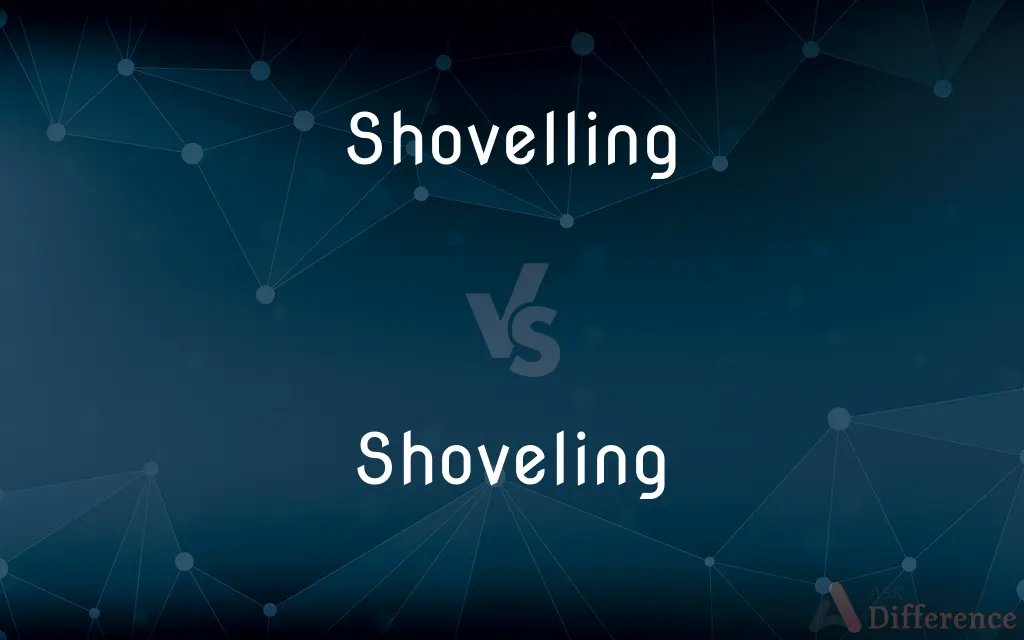Shovelling vs. Shoveling — What's the Difference?
By Tayyaba Rehman & Urooj Arif — Updated on April 15, 2024
"Shovelling" is the British English spelling, focusing on double 'l', while "Shoveling" is the American English variant with a single 'l'.

Difference Between Shovelling and Shoveling
Table of Contents
ADVERTISEMENT
Key Differences
Shovelling is primarily used in British English, emphasizing a traditional approach to spelling that often doubles consonants before adding suffixes, whereas Shoveling is the American English spelling where typically only one consonant is used. This difference highlights variations in English spelling rules between the UK and the US.
In terms of pronunciation, Shovelling and Shoveling sound identical, indicating that the spelling variation does not affect how the words are spoken. This showcases how English spelling can vary significantly across regions without impacting phonetics.
When it comes to writing in a formal context, choosing between Shovelling and Shoveling depends on the regional spelling norms of the audience. British publications adhere to "Shovelling", while American outlets prefer "Shoveling".
Educational systems in the UK and the US teach these spelling differences from an early age, thus reinforcing the use of "Shovelling" and "Shoveling" respectively in each region. This educational aspect ensures that the regional spelling conventions continue to thrive.
In digital communication, autocorrect and spell-check systems are typically region-specific, which suggests "Shovelling" in British English settings and "Shoveling" in American English settings, thereby preventing spelling errors in different forms of online writing.
ADVERTISEMENT
Comparison Chart
Spelling
Uses double 'l' (ll)
Uses single 'l' (l)
Regional Usage
Preferred in the UK, Australia, and other regions using British English
Preferred in the US and other regions using American English
Educational Standards
Taught in British educational systems
Taught in American educational systems
Digital Tools
Recognized by British English spell-check systems
Recognized by American English spell-check systems
Phonetic Impact
No phonetic difference from American spelling
No phonetic difference from British spelling
Compare with Definitions
Shovelling
Act of using a shovel to move or lift material.
He spent the morning shovelling snow from the driveway.
Shoveling
To move or remove large amounts of something laboriously.
They were shoveling dirt in the garden.
Shovelling
To clear or clean with a shovel.
After the storm, we were shovelling mud out of the basement.
Shoveling
To clear or clean with a shovel.
After the storm, we were shoveling mud out of the basement.
Shovelling
To load or unload material using a shovel.
Workers were shovelling coal into the large bins.
Shoveling
To load or unload material using a shovel.
Workers were shoveling coal into the large bins.
Shovelling
To move or remove large amounts of something laboriously.
They were shovelling dirt in the garden.
Shoveling
Act of using a shovel to move or lift material.
He spent the morning shoveling snow from the driveway.
Shovelling
To make an exaggerated effort, often humorously.
He was shovelling in food as if he hadn't eaten in days.
Shoveling
To make an exaggerated effort, often humorously.
He was shoveling in food as if he hadn't eaten in days.
Shovelling
A tool with a handle and a broad scoop or blade for digging and moving material, such as dirt or snow.
Shoveling
A tool with a handle and a broad scoop or blade for digging and moving material, such as dirt or snow.
Shovelling
A large mechanical device or vehicle for heavy digging or excavation.
Shoveling
A large mechanical device or vehicle for heavy digging or excavation.
Shovelling
The amount that a shovel can hold; a shovelful
One shovel of dirt.
Shoveling
The amount that a shovel can hold; a shovelful
One shovel of dirt.
Shovelling
To move or remove with a shovel.
Shoveling
To move or remove with a shovel.
Shovelling
To make with a shovel
Shoveled a path through the snow.
Shoveling
To make with a shovel
Shoveled a path through the snow.
Shovelling
To convey or throw in a rough or hasty way, as if with a shovel
He shoveled the food into his mouth.
Shoveling
To convey or throw in a rough or hasty way, as if with a shovel
He shoveled the food into his mouth.
Shovelling
To clear or excavate with or as if with a shovel
Shoveling off the driveway after the snowstorm.
Shovels out the hall closet once a year.
Shoveling
To clear or excavate with or as if with a shovel
Shoveling off the driveway after the snowstorm.
Shovels out the hall closet once a year.
Shovelling
To dig or work with a shovel.
Shoveling
To dig or work with a shovel.
Shovelling
(British spelling) shovel
Shoveling
(American spelling) shovel
Shovelling
The act by which something is shovelled.
Shoveling
Alternative form of shovelling
Common Curiosities
Is there a pronunciation difference between "Shovelling" and "Shoveling"?
No, there is no pronunciation difference between the two spellings.
Are there any exceptions to the regional usage of "Shovelling" and "Shoveling"?
Yes, global influence and digital media are blurring some traditional regional spelling distinctions.
Can "Shovelling" and "Shoveling" be used interchangeably in writing?
They should not be used interchangeably; the choice depends on the regional spelling norms of the audience.
How do spell-check systems handle "Shovelling" and "Shoveling"?
Spell-check systems are typically configured to recognize the spelling that corresponds to the setting's language preference, either US or UK English.
What is the main difference between "Shovelling" and "Shoveling"?
The main difference is the spelling; "Shovelling" uses double 'l' while "Shoveling" uses a single 'l'.
What are some common uses of "Shovelling" and "Shoveling"?
Common uses include moving snow, dirt, or other materials using a shovel.
How do writers choose between "Shovelling" and "Shoveling"?
Writers choose based on the regional language norms of their intended audience.
Why does British English use double 'l' in "Shovelling"?
British English often doubles consonants before adding suffixes to maintain consistent spelling rules.
Can using the wrong spelling affect the readability of a text?
Using the wrong regional spelling might confuse readers accustomed to another form of English.
Are there educational impacts due to these spelling differences?
Yes, educational systems in different regions teach the respective spellings, reinforcing regional norms.
Is one spelling more correct than the other?
No, neither spelling is more correct; the choice depends on regional preferences.
How do international companies handle these spelling differences in their communications?
International companies often choose a standard form of English (usually American or British) and consistently use it in their communications.
Are there any historical reasons for the different spellings?
The differences arise from variations in spelling standardization between British and American English.
Does digital communication affect the use of "Shovelling" and "Shoveling"?
Yes, digital communication tools like autocorrect may suggest the spelling based on the user's location settings.
What advice would you give to someone learning English regarding these spellings?
Learners should be aware of these differences and choose spellings based on the form of English they are learning or using.
Share Your Discovery

Previous Comparison
Mindset vs. Mindframe
Next Comparison
Confidential vs. SecretAuthor Spotlight
Written by
Tayyaba RehmanTayyaba Rehman is a distinguished writer, currently serving as a primary contributor to askdifference.com. As a researcher in semantics and etymology, Tayyaba's passion for the complexity of languages and their distinctions has found a perfect home on the platform. Tayyaba delves into the intricacies of language, distinguishing between commonly confused words and phrases, thereby providing clarity for readers worldwide.
Co-written by
Urooj ArifUrooj is a skilled content writer at Ask Difference, known for her exceptional ability to simplify complex topics into engaging and informative content. With a passion for research and a flair for clear, concise writing, she consistently delivers articles that resonate with our diverse audience.
















































